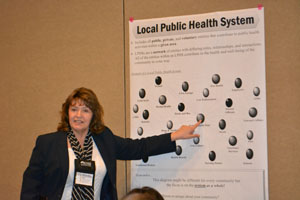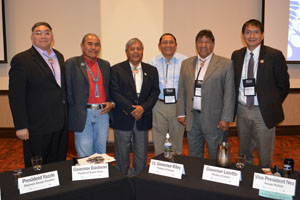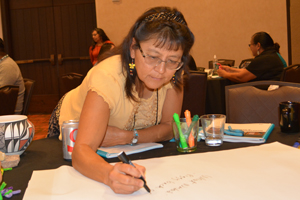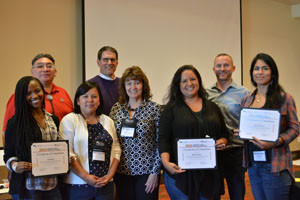October 23, 2015
 On October 21-23, 2015, the Institute for Indigenous Knowledge & Development (IIKD) sponsored the 2015 Community Health Assessment Workshop (CHAW), which focused on the theme of “Indigenous Community Health Assessment and Data Sovereignty: Experiences and Approaches that work!” The workshop was open to teams of individuals representing American Indian (AI) Tribes, Pueblos, and Nations as well as AI-serving programs such as non-profit organizations and technical support agencies. Nearly 50 individuals (in 16 teams) were in attendance from 7 states across the US.
On October 21-23, 2015, the Institute for Indigenous Knowledge & Development (IIKD) sponsored the 2015 Community Health Assessment Workshop (CHAW), which focused on the theme of “Indigenous Community Health Assessment and Data Sovereignty: Experiences and Approaches that work!” The workshop was open to teams of individuals representing American Indian (AI) Tribes, Pueblos, and Nations as well as AI-serving programs such as non-profit organizations and technical support agencies. Nearly 50 individuals (in 16 teams) were in attendance from 7 states across the US.
The workshop was facilitated by Tim Karpoff (independent consultant) with further (session) facilitation by IIKD (Dr. Tassy Parker, Norman Cooeyate, and Nathania Tsosie), the Center for Native American Health (Micah Clark), the NM Department of Health (Sam Swift), and the Albuquerque Area Southwest Tribal Epidemiology Center (Dr. Kevin English, Dr. Michele Suina, Dornell Pete, and Judith Espinoza). Additional CHA mentoring and administrative support was offered by IIKD student staff (Kyle Smith and Tia Benally) and CNAH staff (Shannon Martin and Jessica Ahiyite).
 Governor Walter Dasheno (Santa Clara Pueblo), Governor Raymond Loretto, DVM (Jemez Pueblo), Vice President Jonathan Nez (Navajo Nation), 2nd Lt. Governor Kurt Riley (Acoma Pueblo), and President Duane “Chili” Yazzie (Shiprock Navajo Chapter) were on hand to open the workshop and to discuss strategies for engaging Tribal leaders in the practice of CHA. Second Lt. Governor Riley said that CHA can provide tribes with a “guiding document” for Tribes to move toward health self-determination “with one mind, one intent, one goal, and one heart.”
Governor Walter Dasheno (Santa Clara Pueblo), Governor Raymond Loretto, DVM (Jemez Pueblo), Vice President Jonathan Nez (Navajo Nation), 2nd Lt. Governor Kurt Riley (Acoma Pueblo), and President Duane “Chili” Yazzie (Shiprock Navajo Chapter) were on hand to open the workshop and to discuss strategies for engaging Tribal leaders in the practice of CHA. Second Lt. Governor Riley said that CHA can provide tribes with a “guiding document” for Tribes to move toward health self-determination “with one mind, one intent, one goal, and one heart.”
Current Native Health Sciences students from the University of New Mexico also had the opportunity to meet with CHAW participants in a Student/Professional Mixer co-organized by the Center for Native American Health (CNAH). The Mixer was an opportunity for workshop participants to meet with students in the “workforce pipeline” and to discuss their community priorities and future workforce needs. Some of the professions desired by those in attendance were nutritionists, dieticians, and physical therapists.
 Throughout the workshop, participants had the opportunity to gain knowledge and skills that could be used in conducting a CHA. Topics included: learning about CHA models/methods; obtaining, using, and interpreting secondary data; focus group facilitation; survey design and analysis; and strategies for maintaining momentum.
Throughout the workshop, participants had the opportunity to gain knowledge and skills that could be used in conducting a CHA. Topics included: learning about CHA models/methods; obtaining, using, and interpreting secondary data; focus group facilitation; survey design and analysis; and strategies for maintaining momentum.
Sessions were highly interactive and included hands-on exercises, facilitated discussions, and extensive question/answer sessions. At the beginning of each session, participants were presented with background information and, in some case, examples of ways other tribes/communities had applied the concepts being discussed. Each day ended with a short discussion to debrief the activities of the day to help participants harvest and clarify the learnings of the day and to apply them to their CHA.
 At the conclusion of the workshop, participants worked in teams (by tribe/organization) to develop a high-level action plan for CHA. CHA mentors encouraged participants to think about the resources and systems already existing in their home communities that could assist in their CHA such as internal/external partnerships, funding sources, and health data. Teams were also reminded to consider important cultural and community events, tribal protocols, and values around community engagement, health, and wellness.
At the conclusion of the workshop, participants worked in teams (by tribe/organization) to develop a high-level action plan for CHA. CHA mentors encouraged participants to think about the resources and systems already existing in their home communities that could assist in their CHA such as internal/external partnerships, funding sources, and health data. Teams were also reminded to consider important cultural and community events, tribal protocols, and values around community engagement, health, and wellness.
For more information about CHA Workshop, please contact Dr. Tassy Parker or Nathania Tsosie.
MSC07 4246
1001 Medical Arts Ave NE
Albuquerque, NM 87102
Physical Location:
Integrity Building
2nd Floor
Phone: 505-272-4100
Fax: 505-272-6019
Email: hsc-cnah@salud.unm.edu